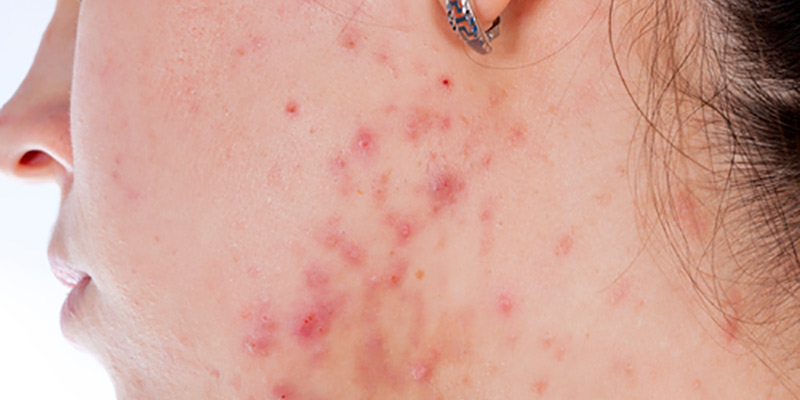Understanding Acne
Acne is the single most common skin condition in the United States, and it can affect both teens and adults. Although there are a number of both over-the-counter and prescription treatment options for acne, the best first step when dealing with this common skin concern is to consult a dermatologist. He or she can assess your skin type and recommend the appropriate products and treatments to match your individual needs.
What Causes Acne?
There are a number of factors that can contribute to acne breakouts, such as diet, hormone fluctuations and stress, but these are all due to three primary underlying causes:
- Excess oil production. The skin naturally produces sebum, or oil, but sometimes too much is produced. Hormone changes and stress can lead to this excess oil production, which plays a role in acne flare-ups.
- Clogged pores. Excess oil, dirt, makeup and other debris can become trapped inside your pores. Using products labeled as “non-comedogenic” can help you to avoid this problem, as these products are specifically formulated not to clog pores.
- Bacteria that becomes trapped in clogged pores. The bacteria P. acnes can become trapped inside clogged pores along with dirt and oil. This causes the inflammation and redness associated with acne breakouts.
How to Treat Acne
While avoiding certain triggers like dairy products may help to control your acne, you’ll want to talk to your dermatologist about the various treatment options that can promote clear skin on a long-term basis. In many cases, different treatments may be mixed and matched, depending on your unique skin type. Just be sure to follow your dermatologist’s instructions to avoid skin irritation or scarring.
In order to effectively treat acne, your dermatologist will recommend treatments that address the three main causes of the condition:
- Decrease oil production. Topical products such as foaming cleansers or spot treatments can’t affect the production of oil, but they can help to remove excess oil from the skin. Salicylic acid cleansers and toners can, however, penetrate through the oil to clean out clogged pores. Your dermatologist may prescribe an oral medication such as oral contraceptives, spironolactone or isotretinoin to decrease oil production.
Lifestyle changes like incorporating healthy stress management habits and getting adequate sleep can also help to decrease oil production by lowering your body’s production of the stress hormone cortisol.
- Prevent clogged pores. Salicylic acid and retinol are often prescribed together to help manage clogged pores. Salicylic acid is able to penetrate the skin to clear clogged pores, and retinol works by regulating the natural process of dead cells flaking from the skin, which can contribute to clogged pores. When used together, these ingredients can be very effective for clearing the skin, but they can have a drying or flaking effect. If skin dryness or irritation becomes a concern, it may be necessary to apply these products one to three days apart.
You should also avoid using skincare or haircare products that contain acne-causing ingredients such as isopropyl myristate and coconut oil. And be sure to wash your face at night before going to bed to remove any makeup, sweat, dirt or other impurities that may have accumulated on your skin throughout the day.
- Decrease bacteria. Topical or oral antibiotics may be prescribed to help decrease the acne-causing bacteria on your skin. Benzoyl peroxide, silver-coated textiles and blue light have also been shown to reduce skin bacteria. Topical products generally need to be applied twice daily in order to minimize new bacteria.
Work Closely with Your Dermatologist
The most important thing to keep in mind when treating and managing acne is that you should continue to follow your dermatologist’s instructions, even once you begin to see a noticeable improvement in your skin’s condition. Any acne treatment regimen is going to take eight weeks to deliver results, so be patient with your skin and give acne-fighting products enough time to work.
Dr. Leslie Baumann, M.D. and her team at Baumann Cosmetic Dermatology believe in proof, not promises. World-recognized for both cosmetic and general dermatology, our treatment strategies rely exclusively on evidence-based, scientifically verified products and procedures that promote skin health and a natural appearance. We combine effective medical procedures with individualized instruction on proper skincare, nutrition, supplementation and lifestyle in order to maximize the health of the skin and body as a whole while minimizing the effects of aging. For more, visit Dr. Baumann’s blog for daily updates Monday through Friday, or inquire about an appointment through Derm.net.



